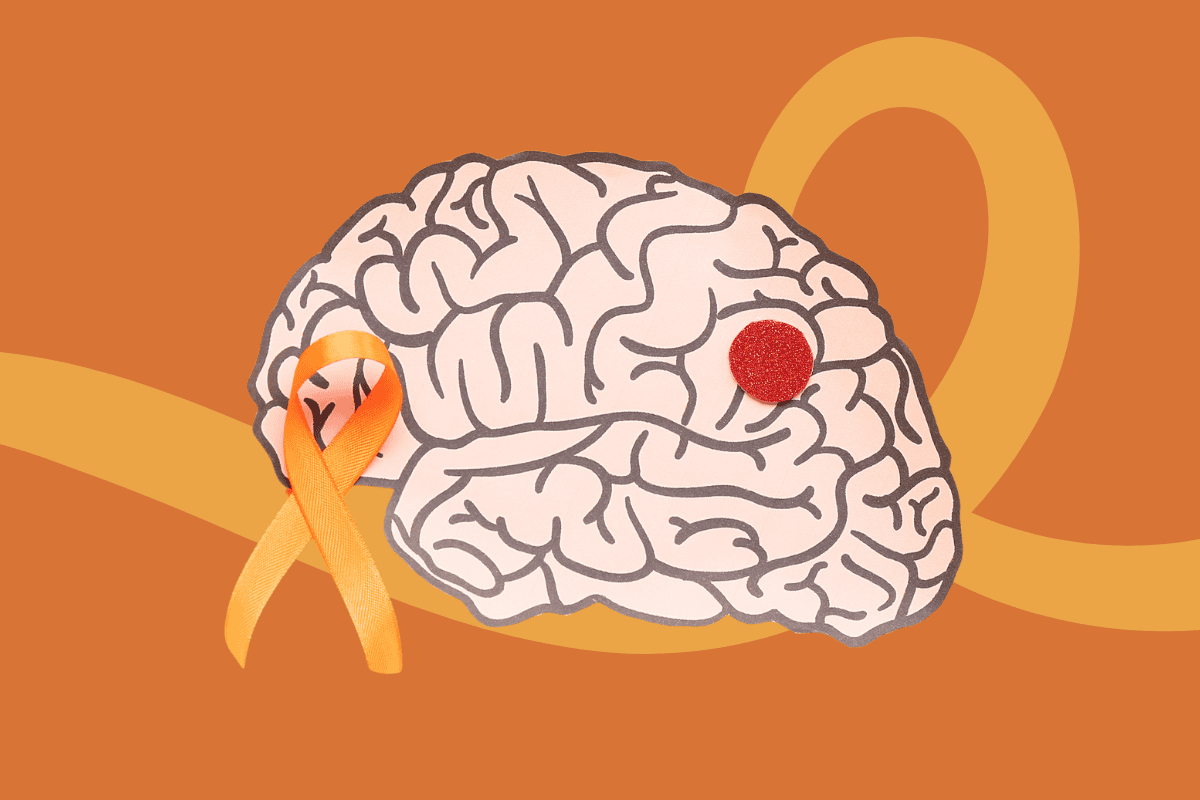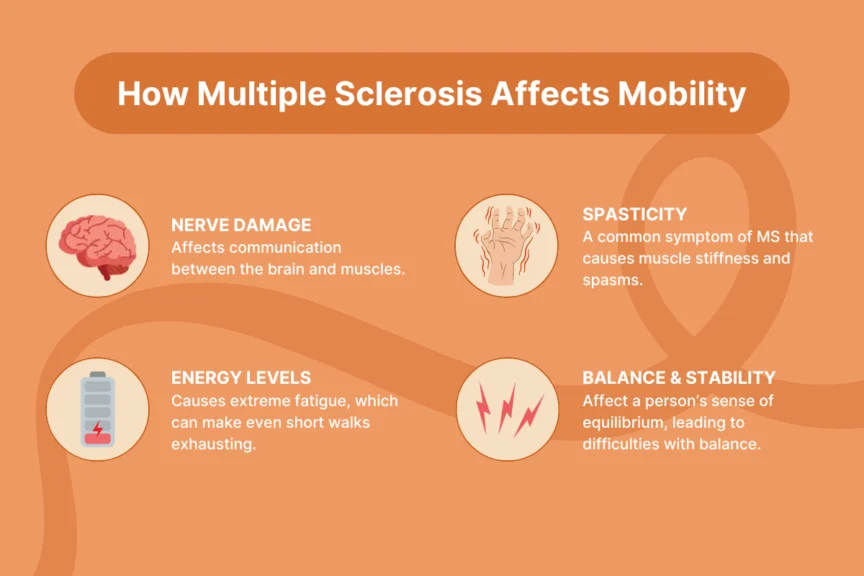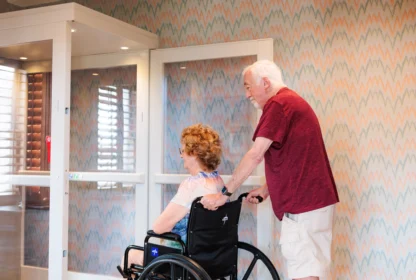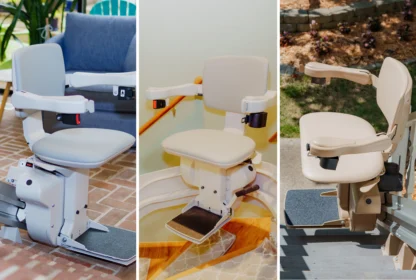Multiple Sclerosis Awareness Month: How Multiple Sclerosis Affects Mobility

March is Multiple Sclerosis (MS) Awareness Month, a time to reflect on the impact MS has on millions of individuals worldwide. As a neurological disorder, MS affects the central nervous system and can lead to a range of challenges, particularly when it comes to mobility.
One of the most significant struggles that individuals with MS face is walking difficulties. Understanding how MS affects mobility is essential, as it enables better support and awareness for those living with the condition, their families, caregivers, and healthcare providers.
Multiple sclerosis affects each person differently, but the progressive nature of the disease often leads to gradual loss of motor control. This can severely impact a person’s ability to walk, maintain balance, and perform daily activities that many take for granted. At 101 Mobility, we’re dedicated to supporting those with this condition, providing ongoing assistance, high-quality accessibility tools, and helpful resources. Read on to learn more about multiple sclerosis and mobility issues, hear what solutions are available today, and get insights on how 101 Mobility can help.
How Multiple Sclerosis Affects Walking and Mobility

Multiple sclerosis causes a breakdown in communication between the brain and muscles due to nerve damage, which disrupts normal movement and coordination. This nerve damage can result in several mobility-related issues, making walking more difficult. MS and walking difficulties can include:
Nerve Damage & Muscle Control
MS affects the myelin, the protective covering of nerve fibers, leading to disrupted signals between the brain and muscles. This causes MS-related muscle weakness and stiffness, affecting coordination and muscle control.
Fatigue & Energy Levels
Many individuals with MS experience extreme fatigue, often referred to as “MS fatigue,” which can make even short walks exhausting. This reduced energy also makes maintaining a steady walking pace challenging, which can be frustrating.
Spasticity & Coordination Issues
Muscle tightness, also known as spasticity, and coordination problems are common with MS, causing the muscles to stiffen and making it difficult to move fluidly. This often results in stumbling, foot dragging, or difficulty initiating a step.
Balance & Stability Concerns
In addition to MS-related muscle weakness, MS can affect a person’s sense of equilibrium, leading to difficulties with balance. This increases the risk of falls, which can further limit independence and mobility.
While MS and walking difficulties go hand in hand, keeping track of these symptoms can help you better navigate challenges related to this condition and improve your quality of life.
Common Mobility Challenges for Individuals With MS
Multiple sclerosis and mobility issues extend past just walking difficulties. Other specific mobility challenges often accompany walking difficulties in MS, including:
Difficulty Lifting the Foot (Foot Drop)
Foot drop is a common symptom causing individuals to have difficulty lifting their feet, leading to stumbling. This can often be addressed with walking aids like braces or specialized footwear.
Leg Weakness and Tremors
MS-related muscle weakness can make standing or walking for extended periods difficult. Tremors in the legs can further affect stability, making it harder to move around safely.
Numbness and Sensory Changes
MS can cause numbness or altered sensations in the legs, affecting a person’s ability to feel the ground while walking. This increases the risk of accidents, as the body may not register uneven surfaces or obstacles.
Sudden Loss of Mobility
Symptoms of MS can fluctuate, meaning that someone may experience sudden periods of mobility loss. This requires varying levels of assistance to maintain movement and safety, depending on the stage of the condition.
Increased Fall Risk
MS-related mobility challenges often lead to an increased risk of falls, which can be debilitating and dangerous. To reduce this risk, home modifications and assistive devices are essential for safety. Want to learn more about helping someone who has fallen? Read our blog to get tips on navigating this tricky situation.
Assistive Devices That Can Help With MS and Walking Difficulties
While dealing with multiple sclerosis and mobility issues can be challenging, thankfully there are numerous assistive devices for multiple sclerosis that can help individuals regain independence and navigate their surroundings more easily. Some of the most effective walking aids for MS patients include:
Canes & Walking Aids
For early-stage mobility challenges, canes and walking aids provide much-needed stability. These devices can help individuals maintain balance while walking—and give them peace of mind.
Walkers
Offering more balance support than canes, walkers are one of the best walking aids for MS patients and are often used by individuals with more advanced mobility difficulties. They help reduce the risk of falls and provide additional stability.
Mobility Scooters
Mobility scooters, or power scooters, are an excellent solution for individuals who need to conserve energy. They are one of the best assistive devices for multiple sclerosis, allowing individuals to continue enjoying outdoor activities and remain active without the physical strain of walking. 101 Mobility is proud to offer some of the best power scooters available today, helping those facing these challenges stay mobile.
Stairlifts & Home Modifications
Indoor navigation can be a significant challenge for those with MS. Installing stairlifts can be a lifechanging solution, as this allows those dealing with MS to access all parts of the home with greater ease. 101 Mobility offers a wide variety of stairlifts to work with an array of unique needs and home structures, including outdoor, curved, and straight options.
In addition, considering other home modifications, such as widening doorways or adding grab bars, can make moving safely throughout the home easier.
Wheelchairs & Power Chairs
For those with more advanced MS or limited mobility, wheelchairs and power chairs offer long-term mobility support. These devices are critical for maintaining independence in both home and public settings. Explore 101 Mobility’s range of power chairs to find one right for you and get started on the path to regaining your freedom.
Physical Therapy and Exercise for Managing MS Mobility Issues
In addition to exploring walking aids for MS patients, there are a few other solutions that may be helpful and physical therapy plays an essential role in managing MS-related mobility challenges. Regular exercise can improve strength, flexibility, and coordination, helping individuals stay as mobile and independent as possible. Key components of MS physical therapy options include:
- Stretching & Strength Training: These exercises help maintain muscle function, reduce stiffness, and increase flexibility, which is vital for preventing muscle weakness.
- Balance & Coordination Exercises: Focused exercises can improve balance and coordination, reducing the likelihood of falls and increasing confidence in walking.
- Water Therapy (Aquatic Therapy): Water therapy offers a low-impact environment where individuals can strengthen muscles and improve movement without putting stress on joints.
- Working With a Physical Therapist: Physical therapists can create a personalized rehabilitation plan, ensuring that individuals with MS receive the best possible care and exercise routine for their unique needs.
Remember, you don’t have to handle it all alone. Explore MS physical therapy options and get on track to better symptom management.
How 101 Mobility Supports Individuals With MS
101 Mobility is committed to providing solutions that help individuals with MS maintain independence and mobility. Our team offers personalized mobility assessments and recommends assistive devices tailored to your unique needs. Reach out today to schedule a free in-home consultation.
We offer a wide range of products, from stairlifts and power chairs to home lifts and bathroom modifications, designed to enhance mobility and safety at home. Our expert guidance and support ensure that individuals with MS receive the best possible solutions for their mobility challenges.
Maintaining Independence With MS
Multiple sclerosis can present significant challenges, particularly when it comes to mobility and walking. However, with the right support and assistive devices, individuals with MS can maintain independence, stay active, and continue to live life on their own terms.
If you or a loved one is living with MS and experiencing walking difficulties, explore the range of mobility solutions we offer at 101 Mobility. Our team is here to provide expert guidance, personalized recommendations, and professional installation to help you achieve greater mobility and independence.
We’re here for you. Contact us today to learn more about how we can support you in your journey with MS.


